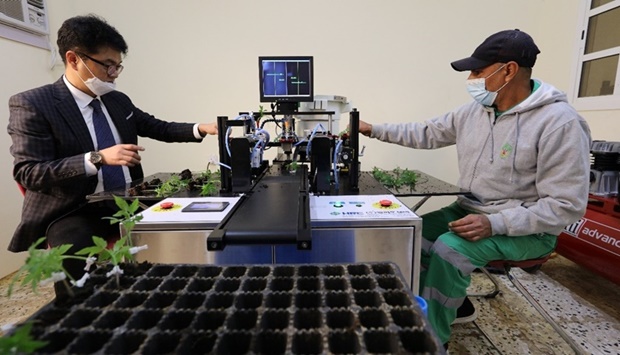An automated vegetable seedling grafting technique has been introduced in Qatar for the first time, the Ministry of Municipality said on Thursday.
The ministry's Agricultural Research Department has taken the initiative to produce grafted vegetable seedlings to implement projects to raise the sustainable productivity of crops to achieve food security, according to a Qatar News Agency report.
This step comes as part of an agreement to adopt a social development programme funded by Japanese company Mitsui, which is specialised in financing research projects.
In this context, a research was funded to the tune of $500,000 to raise the sustainable productivity of vegetable crops. Introduction of this technology is one of the ways to transfer technological means to the farmer community, with the aim of conducting experiments and producing grafted seedlings to address production issues resulting from the Qatari environmental conditions, the QNA report states.
Hamad Saket al-Shammari, director of the Agricultural Research Department, stressed that the fruitful co-operation between the ministry and Mitsui greatly contributed to the implementation of a number of research experiments. This, in turn, led to results and recommendations being presented to farmers and those interested in agriculture in order to serve them and the agricultural sector as a whole.
He pointed out that the introduction of modern technologies is a priority in this programme and comes within the framework of developing vegetable production techniques.
In the same context, Dr Al-Sayed al-Azzazi, an expert on genetic resources in the Agricultural Research Department and supervisor of research experiments funded by Mitsui, said the automated grafting machine has a production capacity of 800 vegetable seedlings per hour. This will help reduce the dependence on labour for the production of grafted seedlings, and the initiative includes sharing the technology and method of cultivation with farmers.
The Agricultural Research Department has organised field training for employees at the Agricultural Research Station in Al Utouriya to produce vegetable seedlings using the automated grafting technique. The use of this technology by the ministry will enable it to support farmers and increase the domestic production of vegetables, which will directly reflect on food security.
This step comes as part of an agreement to adopt a social development programme funded by Japanese company Mitsui, which is specialised in financing research projects.
In this context, a research was funded to the tune of $500,000 to raise the sustainable productivity of vegetable crops. Introduction of this technology is one of the ways to transfer technological means to the farmer community, with the aim of conducting experiments and producing grafted seedlings to address production issues resulting from the Qatari environmental conditions, the QNA report states.
Hamad Saket al-Shammari, director of the Agricultural Research Department, stressed that the fruitful co-operation between the ministry and Mitsui greatly contributed to the implementation of a number of research experiments. This, in turn, led to results and recommendations being presented to farmers and those interested in agriculture in order to serve them and the agricultural sector as a whole.
He pointed out that the introduction of modern technologies is a priority in this programme and comes within the framework of developing vegetable production techniques.
In the same context, Dr Al-Sayed al-Azzazi, an expert on genetic resources in the Agricultural Research Department and supervisor of research experiments funded by Mitsui, said the automated grafting machine has a production capacity of 800 vegetable seedlings per hour. This will help reduce the dependence on labour for the production of grafted seedlings, and the initiative includes sharing the technology and method of cultivation with farmers.
The Agricultural Research Department has organised field training for employees at the Agricultural Research Station in Al Utouriya to produce vegetable seedlings using the automated grafting technique. The use of this technology by the ministry will enable it to support farmers and increase the domestic production of vegetables, which will directly reflect on food security.

